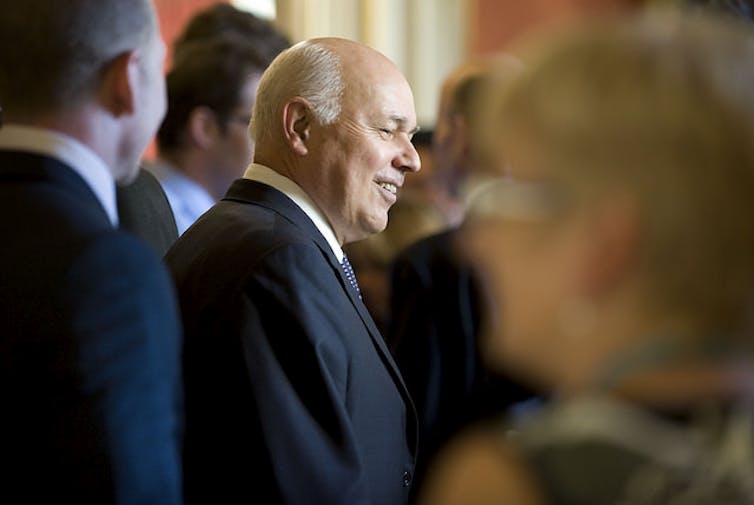Can your government help make you wealthier? If so, UK chancellor of the exchequer, George Osborne, and the prime minister, David Cameron, have ticked all the boxes with their latest budget. The departure of Iain Duncan-Smith and a new sugar tax may have dominated discussion over the past few days, but it is the extension of a generous tax system, less penalties on capital income and less tax liabilities for corporations which mark out the fundamental ideology at play.
There is only one catch. The budget will only make you better off if you are already better off than the majority of UK residents.
With the term “inequality” thrown about quite a bit of late, a budget like this offer an ideal chance to see inequality in action: to see how the gap between rich and poor is maintained or worsened, and what its social consequences are. Government policy plays an important part in this. Here is how it works, in four simple steps.
1. Shift the tax burden from the best to worst off
Capital gains are a key income component of the wealthy. Disposing of profitable assets such as shares carries a charge, the top rate of which is now reduced in this budget from 28% to 20%. This is great news for early entrants to the property market, especially those in London where property price growth rates marginally exceeded the English average last year.

With financial sector growth now recognised as a key contributor to the rising gap between rich and poor, this measure looks set to drive a wedge further between those dependent on earned income, and those with access to “rentier” income sources such as property. And better-off people without access to capital are not forgotten. With the higher income tax threshold raised to £45,000, those on above-average earned incomes will reap substantial benefits.
It is also well established that indirect consumption taxes disproportionately harm the less well-off. While direct taxes such as capital gains lend themselves better to income redistribution, consumption taxes such as VAT – and now the sugar tax – take a greater percentage of the income of low earners. Rather than pursuing the producers, this government has chosen to hit the consumer.
2. Lower taxes on corporations
The direct effects of this measure are more difficult to see. The secret to its negative effects rests in the practice of transfer pricing by multinationals. In a higher-tax regime (such as the US) compared to a low-tax one (such as the Republic of Ireland, and now increasingly the UK), minimal policing of tax avoidance encourages some very creative accounting. In Ireland, recorded Gross National Income (GNI) over the last ten years has been up to 15% lower than Gross Domestic Product (GDP). GNI typically excludes the effect of multinational transfers.

This means nothing for the real economy – there are no jobs or local spin-offs associated with this false output. Yet our reliance on GDP to measure social progress is flawed as a result, and could encourage complacency on more important policy goals such as quality job creation. It is great for corporate share prices however – and thanks to that reduction in capital gains tax, the long-term combined pay-off could be substantial.
3. Cut benefits
The negative public and political reaction to the proposal to cut Personal Independence Payments has been encouraging – and perhaps a sign of the mask slipping. While it may be easy to dress core benefit cuts in the guise of “labour activation”, cuts to disability payments are ethically (never mind economically) unjustifiable. So unconscionable was this particular proposal, that Duncan-Smith had the decency to resign (we won’t get mired in discussion about his motivations here) and the idea eventually got dropped entirely.
Social transfers play a key role in minimising the gap between rich and poor, but this effect is only realised in a system where those who can most afford it pay their fair share and acknowledge that their wealth is at least partly dependent on the cheap and unregulated labour of others. With no sound economic justification (how can you cut benefits in the name of austerity whilst simultaneously shrinking the tax base after all?), this perverse logic can only be ideological. A commitment to the longstanding caricature of the undeserving poor and a parallel commitment to looking after privileged constituents. In IDS’ own words:
It looks like we see benefits as a pot of money to cut because they don’t vote for us.

4. What else?
It doesn’t stop with the budget. If successful, the Trade Union Bill will restrict the ability of labour to strike by introducing new rules on balloting, advance notice periods, mid-strike ballots and stricter regulation of pickets. This will further reduce worker’s bargaining power and produce a more favourable environment for employers better able to discipline labour costs, which will do no harm to share prices.
Implementation of the full range of benefit cuts will be spread across the lifetime of this government, compounding the pain year-by-year, while capital-rich individuals enjoy a windfall. Low-income individuals now face a squeeze from a number of directions. Their income security has been threatened through benefit cuts such as the now rejected proposed reduction to Personal Independence Payments, reduced benefit cap thresholds and freezes on working-age benefit rates. With a 15% rise, to 801,000, in the number of people on zero-hours contracts since 2014 and a sustained assault on unions eliminating a key line of resistance to casualisation, these are likely to be trying years.
Worst of all, perhaps, is the frustrating insidiousness of the way these changes are justified through the government’s unremitting austerity mantra. They fly in the face of empirical evidence; force former cheerleaders like IDS to resign; and spark embarrassing U-turns. At least Margaret Thatcher had the decency to wear her ideology on her sleeve.

